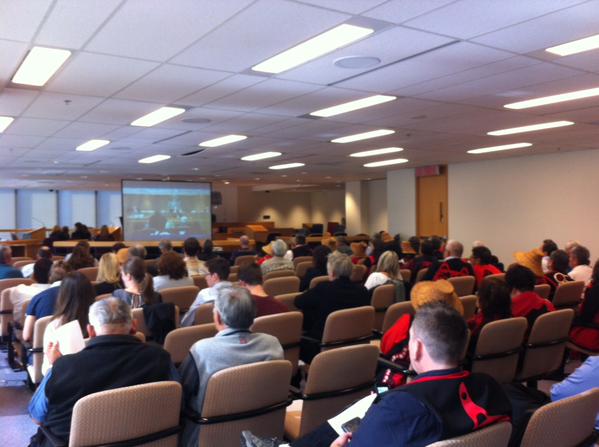
First up this morning, Chris Tollefson presented arguments on behalf of BC Nature, a B.C.-based conservation group. BC Nature’s main argument is that the Joint Review Panel (JRP) failed to conduct a fulsome assessment of the potential environmental impacts of a large oil spill despite having a legal duty to do so under the Canadian Environmental Assessment Act (CEAA). Under section 19 of the CEAA, environmental assessments must include an analysis of “malfunctions or accidents” that may occur in relation to a project. Tollefson argued that the JRP did not conduct a proper assessment of the impacts of a large oil spill because the JRP found that an oil spill would be unlikely. As Tollefson put it, this reasoning is troubling because “we know that low probability, high consequence events can and do happen” (for example, the Enbridge Kalamazoo, Exxon Valdez and BP Deepwater Horizon spills). The environmental assessment process should properly evaluate potentially catastrophic events such as oil spills.
Barry Robinson, representing a coalition of three conservation groups - ForestEthics Advocacy Association, Living Oceans Society and Raincoast Conservation Foundation, pointed to three major legal errors in the JRP Report. First, the JRP did not consider the recovery strategy for the Humpback Whale even though it was obliged to do so under the Species At Risk Act. Tanker traffic from the Enbridge project would pose real threats to the threatened Humpback Whale population including vessel strikes, oil spills, and acoustic disturbances. Robinson argued that such impacts on the Humpback Whale were not properly evaluated in the assessment because the JRP did not meet its legal obligation to consider the Humpback Whale recovery strategy.
Robinson’s second argument was that, after deciding not to include the environmental impacts of oil sands production (including greenhouse gas emissions) in the assessment, it was imbalanced and procedurally unfair for the JRP to have then included economic benefits from potential oil sands development in the assessment.
Finally, Robinson argued that the JRP failed to resolve the issue of whether or not spilled diluted bitumen (dilbit) would sink in the marine environment. At this point, we simply do not know whether dilbit would sink or float in the event of an oil spill. Despite this uncertainty, the JRP ignored the precautionary principle by proceeding as dilbit will not sink. Robinson asserted that the behavior of dilbit was “not a peripheral issue.” Rather it was one of the most important questions with respect to the marine impacts of the project.
Steven Shrybman, representing the labour union Unifor, argued that the JRP was wrong to assume that ‘well-functioning’ markets tend to produce outcomes that are in the public interest. The private interests of pipeline service providers do not represent the public interest of all Canadians. He also argued that the JRP erred by focusing on the economic benefits of oil sands development and refusing to consider greenhouse gas emissions produced by upstream development.
To wrap up the day, Laura Estep, counsel for Northern Gateway, challenged the legal standing of all four environmental groups and Unifor to bring the judicial reviews in the first place, and asked the Court to disregard their submissions. She argued that these groups should not be allowed to participate in the legal challenge because they are not directly affected by the pipeline project and do not meet the legal test to have standing to bring their cases in the public interest. Northern Gateway also sought to introduce fresh evidence consisting of letters it had sent to certain First Nations after the cabinet approval of the Project. However, because Northern Gateway had not yet notified the First Nations of its intent to try to introduce this evidence, the Court directed that Northern Gateway discuss the issue with counsel for the First Nations and report back tomorrow.
Tomorrow lawyers representing the government of Canada will seek to defend their position. I’m excited to hear how Canada responds to the arguments raised by the Applicants. They have their work cut out for them. Sleep tight and see you tomorrow!